|
|
|
Sort Order |
|
|
|
Items / Page
|
|
|
|
|
|
|
| Srl | Item |
| 1 |
ID:
165074
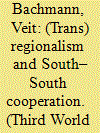

|
|
|
|
|
| Summary/Abstract |
The paper engages critically with the increasing importance of South–South cooperation and the shift from African–European to African–Asian interaction. It argues that South–South cooperation is too often framed in a spatial logics of regional integration and transregional cooperation and thus reproduces spatial understandings that are characteristic for African–European relations but misplaced in the context of African–Asian relations. Moreover, it analyses perceptions about the difference of European and Asian cooperation partners amongst political and societal elites in Kenya and Tanzania, arguing that instead of a shift from African–European to Afrasian spaces of interaction, the two mutually coexist and fulfil complementary functions.
|
|
|
|
|
|
|
|
|
|
|
|
|
|
|
|
| 2 |
ID:
140192
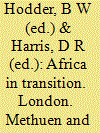

|
|
|
|
|
| Publication |
London, Methuen and co. ltd., 1967.
|
| Description |
x, 378p.:figureshbk
|
|
|
|
|
|
|
|
|
|
|
|
Copies: C:1/I:0,R:0,Q:0
Circulation
| Accession# | Call# | Current Location | Status | Policy | Location |
| 000535 | 916.04960/HOD 000535 | Main | On Shelf | General | |
|
|
|
|
| 3 |
ID:
141877
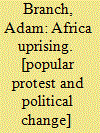

|
|
|
|
|
| Publication |
London, Zed Books, 2015.
|
| Description |
xi, 251p.hbk
|
| Contents |
(B)
|
| Standard Number |
9781780329987
|
|
|
|
|
|
|
|
|
|
|
|
Copies: C:1/I:0,R:0,Q:0
Circulation
| Accession# | Call# | Current Location | Status | Policy | Location |
| 058379 | 960/BRA 058379 | Main | On Shelf | General | |
|
|
|
|
| 4 |
ID:
029097


|
|
|
|
|
| Publication |
London, Weidenfield and Nicolson(Educational) Ltd., 1968.
|
| Description |
144p.hbk
|
| Series |
Twentieth Century History Series
|
| Standard Number |
298762846
|
|
|
|
|
|
|
|
|
|
|
|
Copies: C:1/I:0,R:0,Q:0
Circulation
| Accession# | Call# | Current Location | Status | Policy | Location |
| 001113 | 950/ROO 001113 | Main | On Shelf | General | |
|
|
|
|
| 5 |
ID:
177411
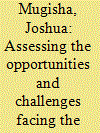

|
|
|
|
|
| Summary/Abstract |
With the world's lowest electrification rate, Africa is repositioning to offer its citizens a brighter future. Global renewable energy agencies and international financing to expedite rural electrification fueled by off-grid solar systems are attracting worldwide attention. Currently, 770 million people lack access to electricity on the continent, and more than 60% live in poor rural areas where the national power grid is non-existent. The challenge herein is how to supply electricity to rural population, living on $1.5 a day, at a reasonable power tariff. Although there are opportunities for off-grid solar energy to keep growing in sub-Saharan countries, it is impossible to ignore particular challenges in these countries. This paper focuses on three sub-Saharan counties: Kenya, Ethiopia, and Rwanda. Rwanda, Kenya, and Ethiopia foster off-grid solar systems as the primary solution through rural electrification programs. This paper provides a comparative analysis of the electrification experiences of these countries in terms of sources of funding, the challenges and opportunities they have been experiencing as well as an analysis of policy implications. The results show that off-grid solar systems improve health, ICT, and micro-enterprises in rural areas. However, governments should generate more robust developmental schemes that provide income to rural people that pushes them above the poverty line and enables them to afford off-grid solar products.
|
|
|
|
|
|
|
|
|
|
|
|
|
|
|
|
| 6 |
ID:
178389


|
|
|
|
|
| Summary/Abstract |
Globalisation presents the opportunity for universities to have a world-wide presence but newer institutions in developing countries have difficulty in embarking on such a journey. This paper presents a case study of an emerging university in East Africa and explores the challenges of high ambition while responding to globalisation. Interviews with senior administrators and academics showed that much time and effort was spent responding to funding issues and aid conditions, attaining international standards in research and teaching, and managing challenges of digital technologies against a background of limited infrastructure. In response to globalisation, we argue that emerging universities of this type should consider re-directing limited resources to focus on long-term projects for growing human capital through professional development while developing basic infrastructure needs.
|
|
|
|
|
|
|
|
|
|
|
|
|
|
|
|
| 7 |
ID:
142551
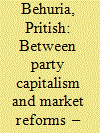

|
|
|
|
|
| Summary/Abstract |
Different strategies have been used by the Rwandan government to promote capitalist accumulation. In some sectors, party and military owned enterprises are predominant. In others, the government has chosen to embrace market-led reforms. Ultimately, the vulnerability experienced by ruling elites contributes to the choice of how capital accumulation is promoted in different sectors. Ruling elites use party and military enterprises to centralise rents and establish control over the direction of economic policy. However, centralising rents is a political choice and excludes individuals from developing access to rents. The pyrethrum sector shows that the use of such groups has resulted in unequal outcomes despite increases in productivity. Reduced international prices have stunted further productivity. Conversely, the mining sector shows evidence of the pursuit of market-led reforms. These reforms have been accompanied by rapid growth in domestic production and exports. Foreign investment was necessary in order to bring capital and expertise to the sector. However, the government has struggled to retain the capacity to enforce legislation and discipline foreign investors in line with national priorities. Both sectors show evidence that ruling elites have been prompted by vulnerability to commit to economic development. Constraints that have accompanied strategies pursued in these sectors have forced the government to work ‘reactively’ to achieve strategic targets.
|
|
|
|
|
|
|
|
|
|
|
|
|
|
|
|
| 8 |
ID:
151495
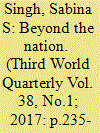

|
|
|
|
|
| Summary/Abstract |
Global frameworks for democratic development today tend to remain within a comparative lens where each country is treated as a sovereign capsule. This portrait eludes the political structures that accompany contemporary globalisation and set the conditions for domestic development. Notably, the comparative perspective eschews the hierarchical nature of states and influential non-state actors that impact democracy movements. Merging international relations theory and comparative politics and using the example of Uganda to illustrate, I create ‘the politics of dispensation.’ Like a doctor dispensing a pill to a patient, Uganda shows how susceptible a country can be to forces beyond democratic control.
|
|
|
|
|
|
|
|
|
|
|
|
|
|
|
|
| 9 |
ID:
121827
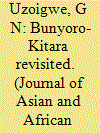

|
|
|
|
|
| Publication |
2013.
|
| Summary/Abstract |
Using primary sources (oral tradition, archival materials, archaeological evidence, 19th century European explorers' and missionaries' accounts) and secondary sources (historical, anthropological, archaeological, etc.), this article reevaluates, in a historical perspective, the decline and diminishment in political power and scale as well as in population and landmass of Bunyoro-Kitara, the earliest kingdom in East Africa's lake region. It concludes that, contrary to the conventional wisdom proffered by 19th century Europeans and sanctified by Makerere University scholarship, the kingdom declined essentially because of the extraordinary errors of judgment and incompetence of most of its rulers from the close of the 17th century to the close of the 19th century, devastating deceases (human and animal), and brutal British conquest resulting in the death of thousands of individuals and loss of territory. By 1900 the kingdom's population had declined by about four-fifths and landmass by about two-thirds. No major African kingdom experienced such an enormous outcome. Herein lies the fascination with this subject.
|
|
|
|
|
|
|
|
|
|
|
|
|
|
|
|
| 10 |
ID:
107192
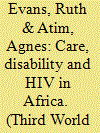

|
|
|
|
|
| Publication |
2011.
|
| Summary/Abstract |
Recent research and policy have recognised the central role of unpaid care-givers (often women and girls) in the global South. Disability rights perspectives, however, challenge the language of 'care' and 'dependence'. Drawing on qualitative research with women living with HIV and children caring for them in Tanzania, and on learning from the National Community of Women Living with HIV and AIDS in Uganda (NACWOLA), this paper explores the divergences and interconnections between the concepts and practices of care, disability and HIV in the context of East Africa. Despite the development of interdependent caring relations, both care-givers and people living with HIV in Tanzania experience 'diminished autonomy'. The participation of people living with HIV, including disabled people, in home-based care and in peer support groups, however, can enhance 'relational autonomy' for both care-givers and care-recipients. We reflect on opportunities and challenges for mutual learning and cross-movement advocacy by disabled people, people living with HIV and care-givers.
|
|
|
|
|
|
|
|
|
|
|
|
|
|
|
|
| 11 |
ID:
170148
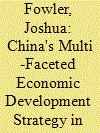

|
|
|
|
|
| Summary/Abstract |
Sino-East African infrastructure investment and international trade have reached record levels and garnered global interest in recent years. Despite this attention, there is a lack of project-level analysis and documentation relating to China's overarching economic strategies in the East African region. By analyzing the Addis Ababa-Djibouti Railway and the Damerjog Port-Ogaden Basin gas pipeline projects, this article discusses project-level details and their roles in China's overarching economic development strategy. Through analysis on bilateral trade and infrastructure development connectivity, this article determines the derivatives and long-term strategic interests of Sino-African trade and infrastructure investment.
|
|
|
|
|
|
|
|
|
|
|
|
|
|
|
|
| 12 |
ID:
151493


|
|
|
|
|
| Summary/Abstract |
Our aim is to problematise the dominant discourses and practices around civil society from a Southern perspective. We first examine critically, from a broadly Gramscian perspective, the way in which the concept of civil society has been deployed in development discourse. This highlights its highly normative and North-centric epistemology and perspectives. We also find it to be highly restrictive in a post-colonial Southern context insofar as it reads out much of the grassroots social interaction, deemed ‘uncivil’ and thus not part of duly recognised civil society. This is followed by a brief overview of some recent debates around civil society in Africa which emphasise the complexity of civil society and turn our attention to some of the broader issues surrounding state-society relations, democracy and representation in a Third World context, exemplified through our case study research in Mozambique, Inhassunge district (Zambézia Province). The privileging of Western-type Non-governmental organizations (NGOs) as drivers of democracy and participatory development in Mozambique have considerable implications for current debates around good governance, civil society strengthening and social accountability programmes and strategies.
|
|
|
|
|
|
|
|
|
|
|
|
|
|
|
|
| 13 |
ID:
163750
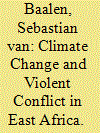

|
|
|
|
|
| Summary/Abstract |
How does climate change affect the risk and dynamics of violent conflict? Existing research shows that climate change can increase the risk of violent conflict and significantly alter the dynamics of existing conflicts. Less is known about the exact mechanisms through which climate change affects violent conflict. In this article, we address this lacuna in light of the first systematic review of both quantitative and qualitative scholarship. Through an analysis of forty-three peer-reviewed articles on climate-related environmental change and violent conflict in East Africa published 1989–2016, we evaluate to what extent the literature provides coherent explanations that identify relevant mechanisms, actors, and outcomes. In addition, we discuss the expected temporal and spatial distribution of violence and the confounding political factors implied in the literature. Against this background, we offer a number of suggestions for how future climate-conflict research can theorize and explore mechanisms. Future research should distinguish between explanations that focus on causes and dynamics of climate-related violent conflict, theoretically motivate when and where violence is most likely to occur, systematically examine the role of state policies and intervention, and explore the implications of each explanation at the microlevel.
|
|
|
|
|
|
|
|
|
|
|
|
|
|
|
|
| 14 |
ID:
110805


|
|
|
|
|
| Publication |
2012.
|
| Summary/Abstract |
Previous research on environment and security has contested the existence, nature and significance of a climate driver of conflict. In this study, we have focused on small-scale conflict over East Africa where the link between resource availability and conflict is assumed to be more immediate and direct. Using the parameter of rainfall variability to explore the marginal influence of the climate on conflict, the article shows that in locations that experience rebel or communal conflict events, the frequency of these events increases in periods of extreme rainfall variation, irrespective of the sign of the rainfall change. Further, these results lend support to both a 'zero-sum' narrative, where conflicting groups use force and violence to compete for ever-scarcer resources, and an 'abundance' narrative, where resources spur rent-seeking/wealth-seeking and recruitment of people to participate in violence. Within the context of current uncertainty regarding the future direction of rainfall change over much of Africa, these results imply that small-scale conflict is likely to be exacerbated with increases in rainfall variability if the mean climate remains largely unchanged; preferentially higher rates of rebel conflict will be exhibited in anomalously dry conditions, while higher rates of communal conflict are expected in increasingly anomalous wet conditions.
|
|
|
|
|
|
|
|
|
|
|
|
|
|
|
|
| 15 |
ID:
178902
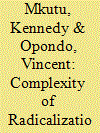

|
|
|
|
|
| Summary/Abstract |
Al-Shabaab, the East-African affiliate of Al Qaeda has carried out a number of large-scale devastating attacks in the region and a steady stream of smaller scale ones. In recent years Al-Shabaab’s ongoing strength has relied upon its ability to build local support within Kenya. This work looks at Kwale County on Kenya’s coast and examines some of the factors involved in radicalization and/or recruitment into the group, including economic hardship, historical marginalization, land injustices, drugs, problems at the family level and poor relationships with state security agencies. It highlights the more recent phenomenon of those returning from fighting with Al-Shabaab and the problems of their reintegration. It concludes that there are a number of phenomenon related in complex and sometimes self-perpetuating ways which all need to be considered in the response to radicalization and recruitment.
|
|
|
|
|
|
|
|
|
|
|
|
|
|
|
|
| 16 |
ID:
191853


|
|
|
|
|
| Summary/Abstract |
Are conservancies hotspots for communal violence and if so, do rainfall anomalies increase the likelihood of violence? The consensus from a rich number of case studies suggests that conservancies (e.g. national parks, game reserves) increase tensions between communities, which often lead to violent conflicts. Yet, these insights remain to be empirically tested using a large-N study. We examine this claim and explore if rainfall anomalies have an amplifying effect on violent conflicts. We contend that the spatial convergence between conservancies and rainfall variability can spark conflicts over access to resources in times of scarcity and create strategic opportunities to satisfy secondary goals in times of abundance. To test our expectations, we use sub-national data from East Africa between 1990 and 2018. Our results suggest that regions with conservancies are somewhat more prone to communal violence and find strong evidence that positive rainfall anomalies increase the likelihood of violent communal conflicts in regions with a conservancy.
|
|
|
|
|
|
|
|
|
|
|
|
|
|
|
|
| 17 |
ID:
114376
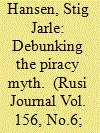

|
|
|
| 18 |
ID:
068360
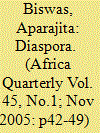

|
|
|
| 19 |
ID:
006302
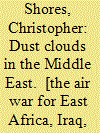

|
|
|
|
|
| Publication |
London, Grubstreet, 1996.
|
| Description |
vii, 308p.Hbk
|
| Standard Number |
189869737X
|
|
|
|
|
|
|
|
|
|
|
|
Copies: C:1/I:0,R:0,Q:0
Circulation
| Accession# | Call# | Current Location | Status | Policy | Location |
| 037893 | 940.544/SHO 037893 | Main | On Shelf | General | |
|
|
|
|
| 20 |
ID:
138238
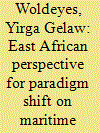

|
|
|
|
|
| Summary/Abstract |
This paper advances the view that the meaning of maritime security should be considered based on lessons of history and requirements of human well-being. It challenges the tendency to separately view maritime security from the political, economic and social structures of the East African littoral states. Based on a critical reading of the history of the development of violent colonial structures in the region, the paper shows that most security discourses in relation to East Africa advance a paradigm that legitimises the control and management of the region’s maritime domain under the surveillance of foreign powers. The framing of poverty and conflicts as internally caused and economically motivated power struggles within fragile states contributes to this paradigm. This paper argues that the East African maritime domain is an integral part of the hinterland, and maritime security should be understood from a perspective that addresses structural violence in the region.
|
|
|
|
|
|
|
|
|
|
|
|
|
|
|
|
|
|
|
|
|